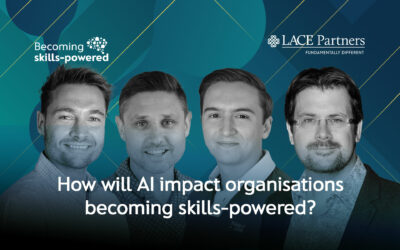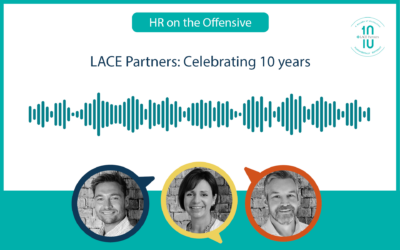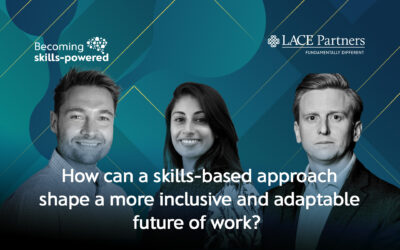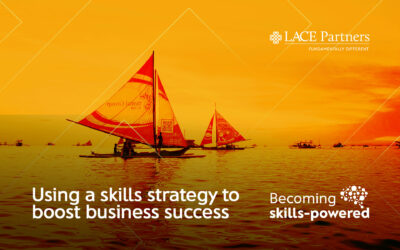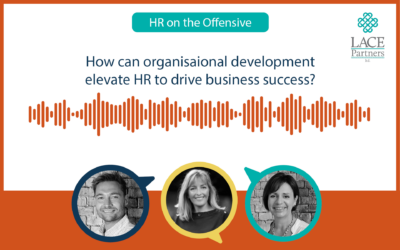How can businesses find the balance between AI and human connection? What do we think the future of AI will look like in HR? In this week’s blog our host Romy Hobson speaks to LACE Partners tech advisory experts Aaron Alburey and Racheal Capel to discuss where we are at now, and where AI will take HR in the near future.
What do we mean when we talk about AI and where does it fit in the workplace?
AI is the simulation of human intelligence. This is where machines or computers are programmed to think like humans, allowing them to execute tasks on our behalf. A great example of this is machine learning which works by analysing patterns of historical data and using these patterns to make decisions for the future.
A common understanding of the true value AI adds to business – not just HR – is that it has the potential to minimise repetitive manual tasks for employees. There are a number of great use cases for HR, particularly in areas which are managing high volumes of requests or processes such as in the talent marketplace or employee case management. There are also notable examples of AI in learning technology, such as Learn Amp or Eightfold where Netflix-style suggestions help improve employee experience and support development. Eightfold uses AI to identify talent and capabilities both within and outside organisations. It can highlight skill gaps and targeted development opportunities. Fuel 50 uses AI to match internal skills to new internal projects and opportunities allowing for a more sophisticated approach to global mobility. Leena AI improves, for example, your experience by providing instant answers to HR queries, helping streamline day-to-day HR processes and seamless integration with existing HRIS. As AI continues to trickle into workplace technologies it should enable businesses to focus their resources on value, whilst hopefully delivering employees a better experience.
What trends have we seen emerging in AI in the workplace
The talent area is a space which has some really exciting developments, both from an employer, as well as an employee/candidate perspective. This includes the ability of talent acquisition teams to rapidly filter CVs, to find key attributes and narrow down their search. Employees can now use career pathing like Workday’s built in tool or vertical technologies like Fuel50 to see recommended roles within their own organisation or additional temporary projects that match their skillset. Technologies are now not only able to suggest roles based on your skills, but also suggest learning based on your career goals and areas for improvement. As a result, AI-powered learning increasingly has the ability to speed up career progression and keep employees engaged and retained.
Chatbots for employees have taken a leaf from the employee experience book and are now being developed to help managers and employees manage internal requests. They are available 24/7 and can respond instantly to requests such as booking time off, scheduling shifts, questions around benefits and other FAQs. Interestingly, according to Oracle and Future Workplace’s annual AI at Work report 64% of employee’s would trust an AI chatbot more than their manager.
If we reflect on the challenges post COVID-19 for businesses, a large one is the ability to carry out effective workforce planning. How will Hybrid working impact our business? How can I redeploy my skills to accelerate our recovery? These are not simple questions to process and this is where AI in HR can really come to the fore to process and analyse the complex calculations to match supply and demand and develop forecasts and options for leadership. Most of the HR large software providers have some form of AI assisted solution for Workforce planning now. As always this needs to be married with HR knowledge of the business and its people to accommodate other influencing factors.
What is the role of AI in HR strategy and decision making? And what are the limitations?
AI can inform decision making by producing data which is more reliable than some historical data sources. That said, AI has the ability to produce inaccurate data which may not take into account intangible or unforeseen factors, e.g. how someone is coping with a recent personal event such as divorce or bereavement and their readiness for new work challenges.
Understandably we have also seen hesitation from some users in relation to AI, including employees, who want to understand what their data is being used for. If your organisation is offering AI tools to help your employees develop through learning, for example, they are entitled to ask what else that information will be used for. If someone’s skills development will inform internal talent moves, it’s important this is communicated effectively and in a transparent manner, but as always it is important to have this matched with human interaction. Very rarely in life are individuals’ career progressions linear and so it is important to ensure that businesses are clear when they are using AI to aid the identification of internal talent and possible career paths, that this is not a silver bullet approach.
Finally, something to be mindful of when looking at how you can use AI in your HR strategy is ensuring you have not overlooked the symbiotic relationship between AI and your data points. The power of AI comes from being able to bring together data from across the business. The focus on data in HR has never been so important both the accuracy, the ownership but also the mindset that data quality is paramount. We love the power of AI and what it can bring to businesses and how it can transform the position of the People function in defining and informing business strategy. However, it is just another tool, which if used well will make decisions easier it should not be viewed as a replacement for good People practices but rather as a major enhancer.
Would you like to talk about how AI could fit in your strategy or better understand what technologies are on the market? Speak to a member of the team to see where we might be able to help.

